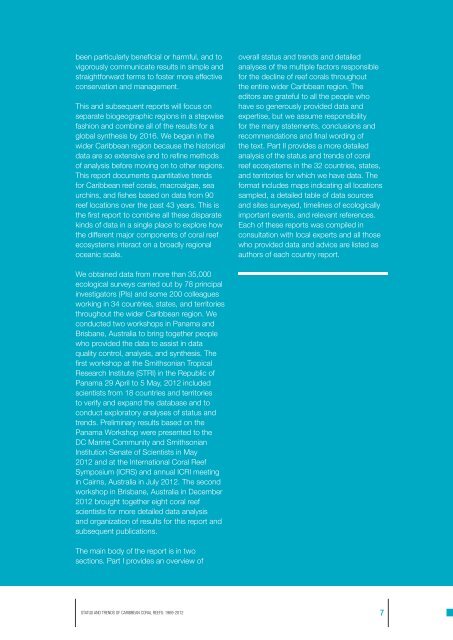Jackson2013-Status and Trendsof Caribbean Coral Reefs
Jackson2013-Status and Trendsof Caribbean Coral Reefs.pdf
Jackson2013-Status and Trendsof Caribbean Coral Reefs.pdf
You also want an ePaper? Increase the reach of your titles
YUMPU automatically turns print PDFs into web optimized ePapers that Google loves.
een particularly beneficial or harmful, <strong>and</strong> to<br />
vigorously communicate results in simple <strong>and</strong><br />
straightforward terms to foster more effective<br />
conservation <strong>and</strong> management.<br />
This <strong>and</strong> subsequent reports will focus on<br />
separate biogeographic regions in a stepwise<br />
fashion <strong>and</strong> combine all of the results for a<br />
global synthesis by 2016. We began in the<br />
wider <strong>Caribbean</strong> region because the historical<br />
data are so extensive <strong>and</strong> to refine methods<br />
of analysis before moving on to other regions.<br />
This report documents quantitative trends<br />
for <strong>Caribbean</strong> reef corals, macroalgae, sea<br />
urchins, <strong>and</strong> fishes based on data from 90<br />
reef locations over the past 43 years. This is<br />
the first report to combine all these disparate<br />
kinds of data in a single place to explore how<br />
the different major components of coral reef<br />
ecosystems interact on a broadly regional<br />
oceanic scale.<br />
overall status <strong>and</strong> trends <strong>and</strong> detailed<br />
analyses of the multiple factors responsible<br />
for the decline of reef corals throughout<br />
the entire wider <strong>Caribbean</strong> region. The<br />
editors are grateful to all the people who<br />
have so generously provided data <strong>and</strong><br />
expertise, but we assume responsibility<br />
for the many statements, conclusions <strong>and</strong><br />
recommendations <strong>and</strong> final wording of<br />
the text. Part II provides a more detailed<br />
analysis of the status <strong>and</strong> trends of coral<br />
reef ecosystems in the 32 countries, states,<br />
<strong>and</strong> territories for which we have data. The<br />
format includes maps indicating all locations<br />
sampled, a detailed table of data sources<br />
<strong>and</strong> sites surveyed, timelines of ecologically<br />
important events, <strong>and</strong> relevant references.<br />
Each of these reports was compiled in<br />
consultation with local experts <strong>and</strong> all those<br />
who provided data <strong>and</strong> advice are listed as<br />
authors of each country report.<br />
We obtained data from more than 35,000<br />
ecological surveys carried out by 78 principal<br />
investigators (PIs) <strong>and</strong> some 200 colleagues<br />
working in 34 countries, states, <strong>and</strong> territories<br />
throughout the wider <strong>Caribbean</strong> region. We<br />
conducted two workshops in Panama <strong>and</strong><br />
Brisbane, Australia to bring together people<br />
who provided the data to assist in data<br />
quality control, analysis, <strong>and</strong> synthesis. The<br />
first workshop at the Smithsonian Tropical<br />
Research Institute (STRI) in the Republic of<br />
Panama 29 April to 5 May, 2012 included<br />
scientists from 18 countries <strong>and</strong> territories<br />
to verify <strong>and</strong> exp<strong>and</strong> the database <strong>and</strong> to<br />
conduct exploratory analyses of status <strong>and</strong><br />
trends. Preliminary results based on the<br />
Panama Workshop were presented to the<br />
DC Marine Community <strong>and</strong> Smithsonian<br />
Institution Senate of Scientists in May<br />
2012 <strong>and</strong> at the International <strong>Coral</strong> Reef<br />
Symposium (ICRS) <strong>and</strong> annual ICRI meeting<br />
in Cairns, Australia in July 2012. The second<br />
workshop in Brisbane, Australia in December<br />
2012 brought together eight coral reef<br />
scientists for more detailed data analysis<br />
<strong>and</strong> organization of results for this report <strong>and</strong><br />
subsequent publications.<br />
The main body of the report is in two<br />
sections. Part I provides an overview of<br />
STATUS AND TRENDS OF CARIBBEAN CORAL REEFS: 1969-2012<br />
7


















